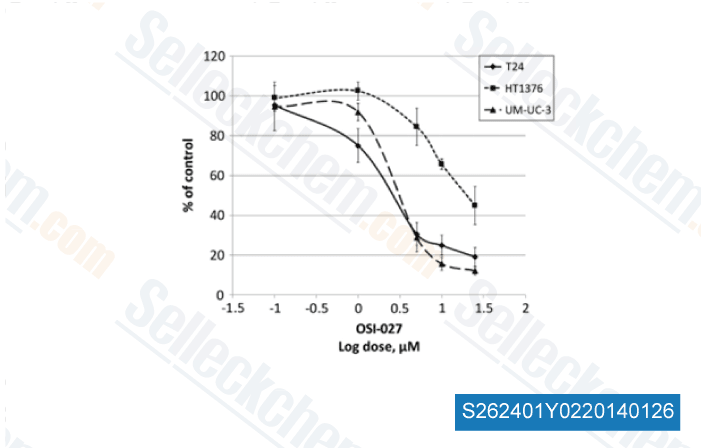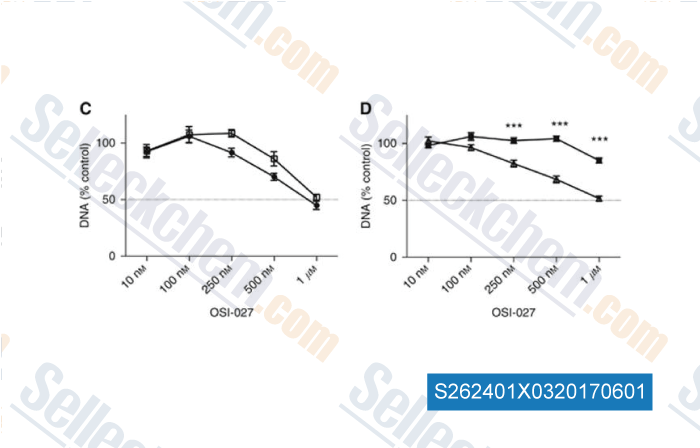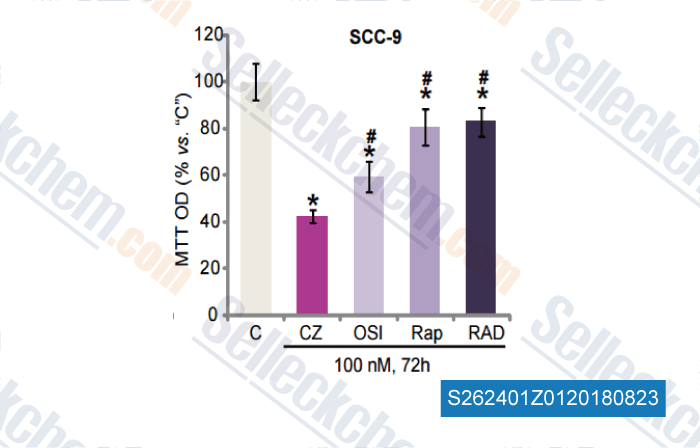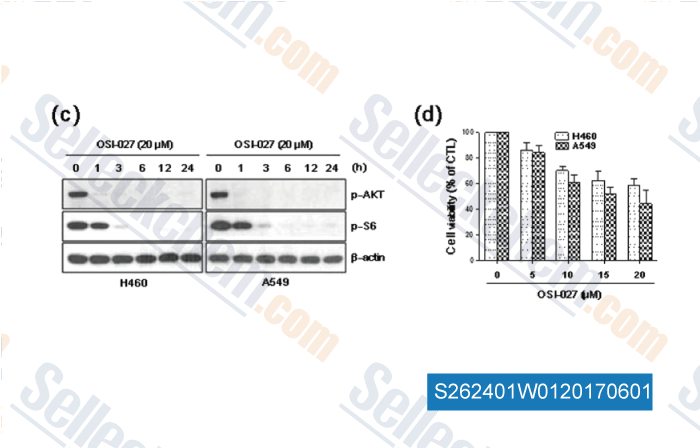|
How to Cite 1. For In-Text Citation (Materials & Methods): 2. For Key Resources Table: |
||
|
Toll Free: (877) 796-6397 -- USA and Canada only -- |
Fax: +1-832-582-8590 Orders: +1-832-582-8158 |
Tech Support: +1-832-582-8158 Ext:3 Please provide your Order Number in the email. We strive to reply to |
Technical Data
| Formula | C21H22N6O3 |
||||||
| Molecular Weight | 406.44 | CAS No. | 936890-98-1 | ||||
| Solubility (25°C)* | In vitro | DMSO | 18 mg/mL (44.28 mM) | ||||
| Water | Insoluble | ||||||
| Ethanol | Insoluble | ||||||
| In vivo (Add solvents to the product individually and in order) |
|
||||||
|
* <1 mg/ml means slightly soluble or insoluble. * Please note that Selleck tests the solubility of all compounds in-house, and the actual solubility may differ slightly from published values. This is normal and is due to slight batch-to-batch variations. * Room temperature shipping (Stability testing shows this product can be shipped without any cooling measures.) |
|||||||
Preparing Stock Solutions
Biological Activity
| Description | OSI-027 (ASP4786, CERC 006, AEVI-006) is a selective and potent dual inhibitor of mTORC1 and mTORC2 with IC50 of 22 nM and 65 nM in cell-free assays, and more than 100-fold selectivity observed for mTOR than PI3Kα, PI3Kβ, PI3Kγ or DNA-PK. This compound induces autophagy in cancer cells. | ||||||||
|---|---|---|---|---|---|---|---|---|---|
| Targets |
|
||||||||
| In vitro | OSI-027 shows the selective and ATP competitive inhibition activities against mTORC1 and mTORC2 with IC50 of 22 nM and 65 nM, respectively. In addition, this compound inhibits mTOR signaling of phospho-4E-BP1 with an IC50 of 1 μM in cell-based assays. [1] It exhibits anti-proliferative activities against several acute leukemia cell lines of myeloid/megakaryocytic origin in a dose-dependent manner, including U937, KG-1, KBM-3B, ML-1, HL-60, and MEG-01 cells. [2] A recent study shows that inhibition of mTORC1/2 by this chemical effectively suppresses phosphorylation of Akt (S473) and cell proliferation in breast cancer cells. [3] |
||||||||
| In vivo | In GEO colorectal xenograft, OSI-027 (65 mg/kg) inhibits both mTORC1 and mTORC2 effectors, including 4E-BP1, Akt, and S6 phosphorylation. Furthermore, mTORC1 and mTORC2 inhibition together by this compound potently inhibits tumor growth more than mTORC1 inhibition by rapamycin. [1] |
Protocol (from reference)
| Kinase Assay: |
|
|---|---|
| Cell Assay: |
|
| Animal Study: |
|
References
|
Customer Product Validation

-
Data from [ Urol Oncol , 2013 , 1078-1439(13)00251-2 ]

-
Data from [ , , Br J Cancer, 2016, 114(6):650-8 ]

-
Data from [ , , Cell Physiol Biochem, 2018, 46(2):676-686 ]

-
Data from [ , , Sci Rep, 2016, 6:28945 ]
Selleck's OSI-027 Has Been Cited by 42 Publications
| Changes in Melanoma Cell Morphology Following Inhibition of Cell Invasion by Third-Generation mTOR Kinase Inhibitors [ Int J Mol Sci, 2025, 26(16)7770] | PubMed: 40869090 |
| Volatilomic response to targeted cancer therapy in vitro [ Sci Rep, 2025, 15(1):19445] | PubMed: 40461777 |
| Three generations of mTOR kinase inhibitors in the activation of the apoptosis process in melanoma cells [ J Cell Commun Signal, 2023, 17(3):975-989] | PubMed: 37097377 |
| Three generations of mTOR kinase inhibitors in the activation of the apoptosis process in melanoma cells [ J Cell Commun Signal, 2023, 17(3):975-989] | PubMed: 37097377 |
| hnRNP C modulates MERS-CoV and SARS-CoV-2 replication by governing the expression of a subset of circRNAs and cognitive mRNAs [ Emerg Microbes Infect, 2022, 11(1):519-531] | PubMed: 35060842 |
| Combined inhibition of BET bromodomain and mTORC1/2 provides therapeutic advantage for rhabdomyosarcoma by switching cell death mechanism [ Mol Carcinog, 2022, 10.1002/mc.23414] | PubMed: 35472745 |
| Minimal mitochondrial respiration is required to prevent cell death by inhibition of mTOR signaling in CoQ-deficient cells [ Cell Death Discov, 2021, 7(1):201] | PubMed: 34349107 |
| Dual Inhibition of mTORC1/2 Reduces Migration of Cholangiocarcinoma Cells by Regulation of Matrixmetalloproteinases [ Front Cell Dev Biol, 2021, 9:785979] | PubMed: 35096817 |
| Mitochondrial Genome-Derived circRNA mc-COX2 Functions as an Oncogene in Chronic Lymphocytic Leukemia [ Mol Ther Nucleic Acids, 2020, 1;20:801-811] | PubMed: 32438315 |
| Combined mTORC1/mTORC2 inhibition blocks growth and induces catastrophic macropinocytosis in cancer cells. [ Proc Natl Acad Sci U S A, 2019, 10.1073/pnas.1911393116] | PubMed: 31732667 |
RETURN POLICY
Selleck Chemical’s Unconditional Return Policy ensures a smooth online shopping experience for our customers. If you are in any way unsatisfied with your purchase, you may return any item(s) within 7 days of receiving it. In the event of product quality issues, either protocol related or product related problems, you may return any item(s) within 365 days from the original purchase date. Please follow the instructions below when returning products.
SHIPPING AND STORAGE
Selleck products are transported at room temperature. If you receive the product at room temperature, please rest assured, the Selleck Quality Inspection Department has conducted experiments to verify that the normal temperature placement of one month will not affect the biological activity of powder products. After collecting, please store the product according to the requirements described in the datasheet. Most Selleck products are stable under the recommended conditions.
NOT FOR HUMAN, VETERINARY DIAGNOSTIC OR THERAPEUTIC USE.
